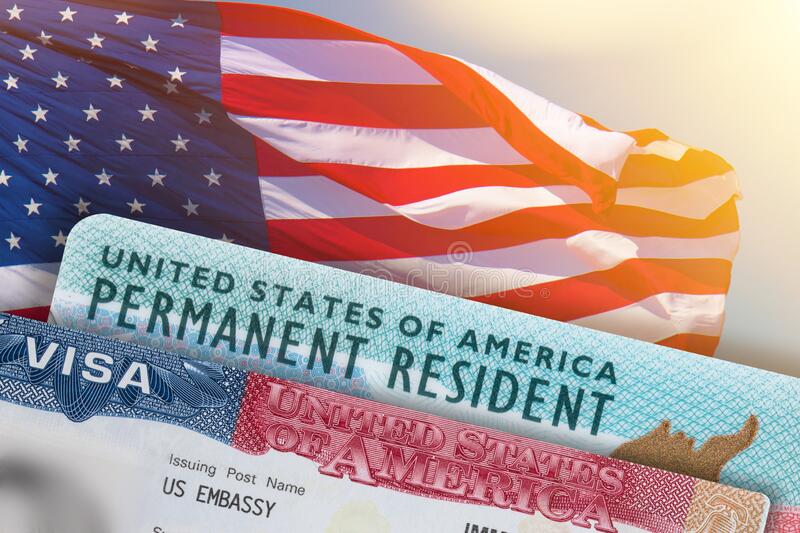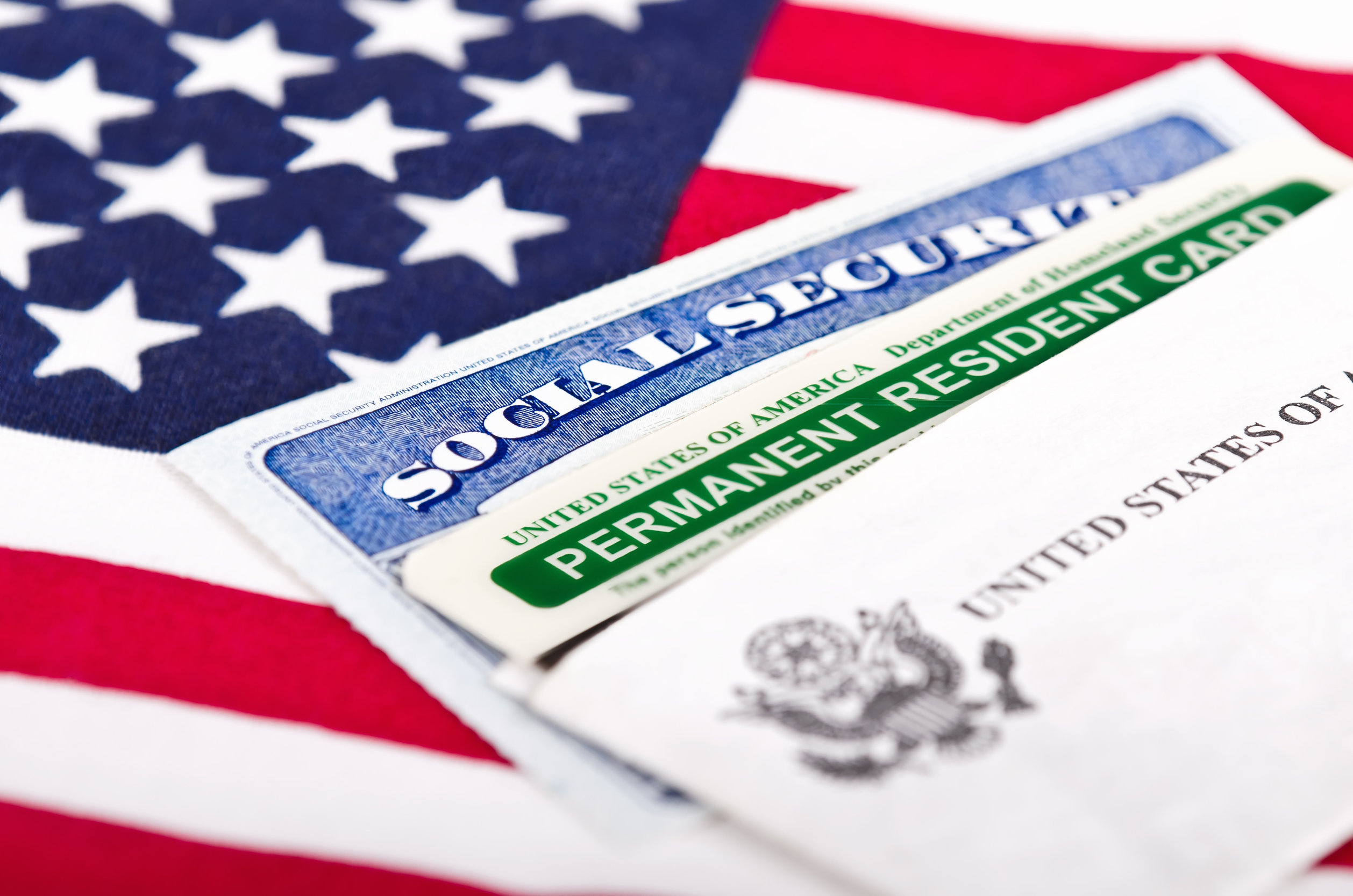Citizenship & Green Card Lawyer
Dedicated Immigration Attorneys in Phoenix, AZ
Phoenix Immigration Lawyer
APPLYING FOR A GREEN CARD OR CITIZENSHIP IN PHOENIX, ARIZONA
is easy with the Milovic Law Firm’s Green Card and Citizenship Lawyers by your side. Hiring a qualified green card or citizenship attorney may be essential to a successful outcome. Whether you are located in Arizona, another state or even outside of the United States, we are passionate, dedicated and successful Phoenix immigration attorneys helping you achieve your American dream.
A green card, officially known as a permanent resident card, indicates that the green card holder is a legally permanent resident of the United States. As a permanent resident, you are authorized to live and work permanently in the U.S. You are also eligible to sponsor certain family relatives to help them attain permanent residence. Green card holders are eligible to apply for U.S. citizenship following a certain period of residency, generally between 3 – 5 years after gaining permanent resident status.
HOW CAN I QUALIFY FOR A GREEN CARD OR CITIZENSHIP?
There are several paths to become a permanent resident in the United States. The most common path to residency is through a family member or employer in the United States. This is referred to as sponsorship. Certain victims of abuse may file for green card status without a sponsor. Other individuals may qualify for permanent residency after obtaining refugee or asylum status. Although permanent residency is the most common path to citizenship, there are other options available for certain individuals who have at least one U.S. parent. Read below to learn more.
Schedule a consultation with the Citizenship and Green Card Lawyers at the Milovic Law Firm today to determine if you are eligible to apply for a green card or citizenship.
What We Cover
A Phoenix Immigration Law Firm with Traditional Values & Modern Techniques. Find Out How Our Immigration Lawyers in Phoenix, AZ can help no matter where you are located. Contact us today!

Family-Based Green Card
You may be eligible to file for a green card if you have a U.S. citizen or permanent resident relative.
Depending on your familial relationship and the lawful status of your U.S. relative, a green card visa may be immediately available to you or you may have to wait years in some instances until a green card is available in your family preference category.
There are an unlimited number of green cards available for immediate relatives. The immediate relative category consists of spouses, unmarried children under 21, and parents of U.S. citizens.
Other relatives who qualify for a green card are separated into family preference categories. Eligible relatives include unmarried children over 21 of U.S. citizens; spouses and children (minor or unmarried) of green card holders; and lastly married children and siblings of U.S. citizens. Each family preference category has a specific quota of green cards issued each year. The surplus of applicants are wait listed until a green card becomes available in their category. The wait times for each category are updated monthly by the U.S. Department of State via the Visa Bulletin.
Removal of Conditional Green Card Status
You will receive a conditional green card for a period of two years if you obtained your permanent residency based on a marriage of two years or less at the time you were granted permanent residency. You must file to remove your conditional status in the 90-day period prior to the expiration of your conditional status. Failure to do so may result in the loss of your permanent residency status.

Employment-Based Green Card
You may be eligible for a green card through a job offer from a U.S. employer or based on certain achievements and accreditations.
The employment-based green card is available to a broad range of employees ranging from extraordinary abilities or advanced degrees to skilled or unskilled workers with less than two years of relevant experience. Employees are separated into employment-based categories based on background and job offer. Certain advanced categories may even self-petition.
For most employment-based categories, the employer must submit a Labor Certification along with the immigrant petition. A Labor Certification is issued by the Department of Labor (DOL), and certifies there are insufficient U.S. workers able, willing, qualified and available to fill the position offered to the non-U.S. worker. The Labor Certification also ensures that wages and working conditions of similarly employed U.S. workers will not be adversely affected by the employment of the non-U.S. worker.
Each employment-based category has an annual quota of green cards available. The surplus of applicants are wait listed until a green card becomes available in their category. The wait times for each category are updated monthly by the U.S. Department of State via the Visa Bulletin.
If you are granted an employment-based green card, your spouse and minor children also qualify for a green card as your derivative applicants.

Citizenship
The process of becoming a U.S. citizen if you were born outside the U.S. is referred to as naturalization.
Certain individuals may be eligible for citizenship at birth or after birth based on their parents’ status. Otherwise, to be eligible for naturalization, you must have acquired legal permanent residence (green card) for a certain period of time. Generally, you must have been a permanent resident for five years, or three years if you attained your legal permanent resident status via your U.S. citizen spouse.
In addition, you must meet the following criteria:
- Be at least 18 years of age at the time you file the application;
- Have continuous residence and physical presence in the United States;
- Be able to read, write, and speak basic English;
- Demonstrate good moral character;
- Demonstrate a knowledge and understanding of U.S. history and government;
- Demonstrate a loyalty to the principles of the U.S. Constitution; and
- Be willing to take the Oath of Allegiance.
You are required to pass an English and civics test during the naturalization process. There are exception available for certain individuals based on age or medical condition. You may be exempt from the English language requirement if you are either age 50 and older and have resided in the U.S. for 20 years, or you are 55 or older and have resided in the U.S. for 15 years. You are still required to pass the civics test, unless you qualify for a medical disability exception certified by a medical doctor.
Once USCIS approves your application for naturalization, you will be invited to a ceremony in which you must take the Oath of Allegiance to the U.S. and you will officially become a U.S. citizen.

Adam Walsh Act
Legislation entitled the Adam Walsh Act imposes immigration penalties on U.S. citizens and permanent residents who are convicted of certain crimes against minors.
A U.S. citizen or permanent resident who is convicted of a specified offense against a minor may be prevented from filing a green card petition on behalf of a close family member, such as a spouse or child. A permanent resident may even be referred to removal proceedings to determine if the individual is deportable.
The law provides an exception to this impediment if the reviewing immigration officer determines that the citizen or permanent resident petitioner does not pose a risk to the petitioned relative despite the conviction. The determination is at the discretion of the reviewing officer and not subject to review.

Waivers of Inadmissibility
Certain criminal acts, health related grounds, unlawful presence and other immigration violations may lead to inadmissibility penalties for immigration applicants.
USCIS provides waivers for certain acts which otherwise impose inadmissibility for the immigration applicant. Most waivers require a demonstration of extreme hardship to a U.S. citizen spouse, parent or child. A showing of extreme hardship generally requires more than a showing of “common consequences” resulting from inadmissibility such as family separation, economic detriment or difficulties of readjusting to a new country. However, USCIS does consider all factors which may impose extreme hardship cumulatively and will pay attention to family ties, social or economic impact, medical needs and country conditions.
The law surrounding waivers is complex. The type of waiver required will depend upon the applicant’s immigration history and presence inside or outside the U.S.

VAWA
The Violence Against Women Act (VAWA) allows a battered spouse, child or parent of a U.S. citizen or permanent resident to self-petition for a green card.
VAWA grants the ability to self-petition for permanent residency, meaning you, as the victim, may file a petition on your own behalf, without the abuser’s involvement or knowledge. Contrary to its legislative name, VAWA provisions apply equally to men and women. To prevail on a VAWA petition, the abused spouse, parent or child must demonstrate to USCIS they were subjected to battery or extreme cruelty by their qualifying U.S. citizen or permanent resident relative.
If you were previously married to the abuser, you may self-petition under VAWA within two years from the divorce if there is a connection between the divorce and the battery or extreme cruelty. You may also self-petition under VAWA within two years of the abuser’s death or loss of lawful status due to an incident of domestic violence.
Unmarried children under the age of 21 of approved VAWA self-petitioners may also qualify for green card status as a derivative applicant.
Schedule Your Initial Consultation Today
Phoenix Immigration Lawyer
Adjustment of Status vs. Consular Processing – What’s the difference?
Adjustment of Status
If you are already lawfully in the United States, then you may be eligible to stay in the in the country and apply for another immigration status – thereby adjusting your status. Adjusting your status in the U.S. has certain benefits, such as attending your interview at the USCIS field office of your home state. Certain eligibility requirements must be met to qualify for adjustment of status. For starters, you must have entered the U.S. lawfully and maintained your lawful status for the entire duration. (certain exceptions may applies). Individuals who qualify to adjust their status may also qualify for work authorization while their adjustment of status application is pending.
Consult a citizenship and green card lawyer to understand how to adjust your status.
Phoenix Immigration Lawyer
Consular Processing
If you are located outside of the United States, or do not qualify to adjust your status inside the country, you must apply for your U.S. immigration benefits at a U.S. embassy or consulate, also known as consular processing. Once USCIS approves your initial immigrant petition (if applicable), your case is transferred to the National Visa Center (NVC) for further processing. The NVC, a component of the U.S. Department of State, is responsible for holding non-immigrant visa applications and immigrant petitions until a visa becomes available and/or an interviews date becomes available at the designated embassy or consulate abroad.
Adjustment of Status vs. Consular Processing may depend on your eligibility criteria and personal preferences. Your individual factors determine which option you are eligible for, or what option better suits your personal circumstances. Cost and wait times may also factor into this decision.
The citizenship and green card attorneys at the Milovic Law Firm can help guide you to make the best decision. Contact us today!
Dedicated Phoenix Immigration Attorney With Real Answers
At Milovic Law Firm, our Phoenix immigration attorneys are dedicated to deliver the highest quality immigration representation.
Dedicated Team
We are devoted to our clients & aggressively pursue every option available to you.
8 Years Experience
We're qualified and experienced to take on your immigration case.
5 Star Reviews
Our standard of excellence is fueled by a desire to protect your immigration rights.
Free Consultation
Schedule your consultation with our Phoenix immigration lawyers today!
How We Are Trusted. See What They Say About Us.
Let me start by saying that Maya is awesome. We engaged Maya to help with my naturalization application preparation and submission to USCIS.
J.M.
Phoenix, AZI had the most pleasant experience working with Maya through me legal proceedings. She was always very prompt in responding to the various questions I had through this process.
N.S.
Phoenix, AZMaya did an awesome job walking me through the steps of my case and helping to ensure that all of the documents were filed with the court in a timely manner.
S.M.
Mesa, AZImmigration Blog
The EB-5 Investor Visa
The United States offers one of the world’s best business-friendly environments and the largest customer base for foreign investors. This...
The O-1 Work Visa – Individuals with Extraordinary Ability
The O-1 Work Visa - Individuals with Extraordinary Ability The United States’ robust economy and focus on entrepreneurship attracts some...
From Green Card to U.S. Citizenship: The Naturalization Process
From Green Card to U.S. Citizenship: The Naturalization Process Have you recently obtained your permanent residency? Congratulations! With your green...
Free Consultation
Get in touch with us. Speak with an experienced imimmigration attorney today.




